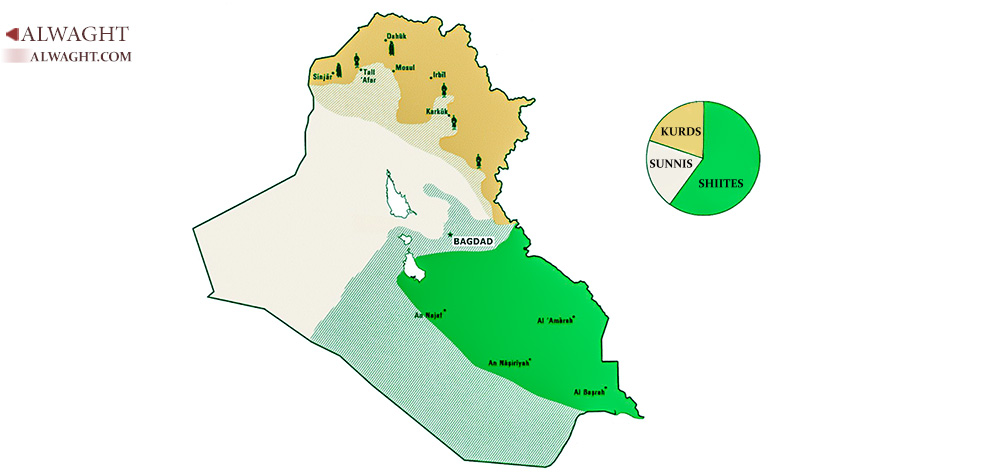Alwaght- Although the rule of ISIS within the borders of Iraq, particularly in Mosul and several other Sunni regions is not over, there are growing speculations over establishing an Iraqi Sunni region (state) and dividing Iraq into political and administrative divisions based on Sunni, Shiite and Kurdish identities.
The intellectual basis for dividing Iraq into three federal states is nothing new, and it could be traced back to the plan of Joe Biden, the US Vice President in 2006. According to Biden’s plan, Iraq should be divided into three federal regions: Sunni, Shiite and Kurdish. After the rise of the ISIS, unlike former conditions in which the US officials partially insisted on the integrity of Iraq, now implicitly speak of power-sharing and revising the political future of Iraq.
As the Kurdistan regional government began to dig a trench in the KRG-controlled areas of Rabia to Jalula, the Iraqi political and security officials stated they also have plans to dig a trench around Baghdad. Although both sides (the Iraqi central government and KRG) have announced that they dig the trenches for security reasons and to counter the threat of ISIS, actually each of them somehow try to mark out their territories in Iraq after ISIS.
In recent days, Kurds have stated their serious intention to declare independence and establish an independent state in northern Iraq. Even if the attempts made by Kurds for disintegration of Iraq and forming a Kurdish state proves fruitless, without a doubt they will not withdraw from the current territorial boundaries that they have seized its control after the emergence of ISIS in Iraq. The Kurds argue that they have shed blood to take control of these areas, and they would withdraw only by giving their blood. This statement means that the Kurds are not afraid of war over areas under their control. Thus, we may conclude that if the Kurds fail to establish an independent state, at the very least, they will remain in the form of a confederation state with broad powers within the framework of the Iraqi national government. The particular situation of Iraqi Kurds, has caught the attention of other Iraqi factions especially the Sunnis. In fact, with the encouragement and financial support of Saudi Arabia and Turkey for the Sunnis in Iraq, now some Sunni factions, contrary to their former positions which considered federalism a threat to the integrity of Iraq, are calling for a Sunni state in the Sunni areas of Iraq. Nevertheless, it should be noted that despite the consent of the United States to the plan of establishing three states in the political arena of Iraq, and supports of Saudi Arabia and Turkey from establishing a Sunni state, there are many people in Sunni-ISIS controlled areas of Iraq who do not officially call for creation of a Sunni state.
Last week, Iraqi parliament speaker Salim Jabouri who is also a Sunni leader and a senior member of the Iraqi Islamic Party went on a journey to the United States. Jabouri made visits to various US political centers and figures, and after his journey began to deliver speeches about reconciliation and conditional national unity. A national unity in which friends of Iraq continue their cooperation and the interests of all political currents are served. The fact is that Jabouri’s statements convey a clear message for everyone. A message saying that the US has a serious plan to divide Iraq into three states ruled by Sunnis, Shiites and Kurds, and in this respect it is essential that efforts be made to bring about national unity.
In general, at first glance, it seems that dividing Iraq into three federal states and even political division of Iraq into three autonomous political units within which three governments are recognized seems to be a suitable solution for the political future of Iraq. But it is not an easy task to divide Iraq into three independent states or three political units as proposed by the United States, because a wide range of regional and international interests play a role in political future of Iraq, and make it virtually impossible to divide Iraq peacefully on the basis of a treaty, without bloodshed or war in Iraq. In addition, within each of the factions inside Iraq, including the Kurds, Shiites and Sunnis, there is a strong polarization which reduce the possibility of consonance and unity among the factions to pursue their demands.



























